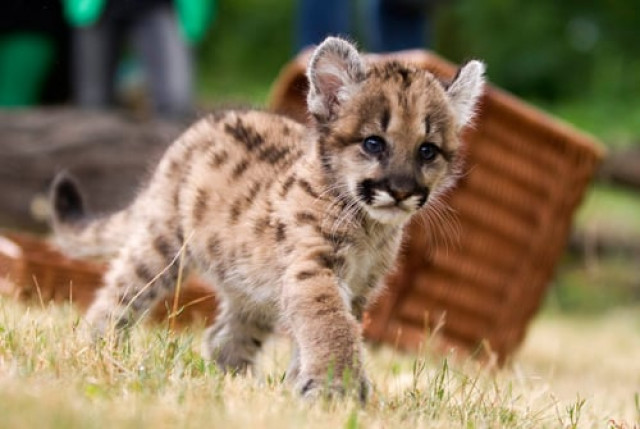Let a market-based mechanism work to protect wildlife
Illegal trafficking of wildlife generates around $19b globally.

Missoula, a seven-week-old puma cub, walks in an enclosure during a display at the Tierpark Zoo in Berlin May 30, 2012. PHOTO: REUTERS
Every year, illegal trade of wild animals and birds generates around $19 billion globally.
Ironically, illegal trafficking is not the only challenge. Pakistan’s Flaura and Fauna are severely threatened by hunting, habitat loss, environmental degradation and corruption in wildlife department. Though majority is looking at the government to take action against it, very few realise the effectiveness of market-based solutions in conservation of wildlife.
Wildlife dept recovers eight endangered falcons
All the challenges faced by wildlife are usually attributed to weaknesses in government regulations and it is believed that strict regulations can do a better job in achieving environmental protection.
Wildlife conservation policy gained momentum in the 1960s and since it’s a provincial matter, each province enacted wildlife protection acts and framed rules to protect certain species and regulate hunting, possession and trade of wildlife. Over the years successive governments have made several amendments in these rules to make them strict. However, the situation is not getting better and the population of wildlife has been declining.
To the surprise of many, ineffective government policy is not the actual problem behind the downfall in the population of wildlife. The real problem in fact is the absence of market institutions such as property rights, mutual exchange, legalised trade etc. All the challenges faced by wildlife are actually symptoms of the absence of market institutions. Free market environmentalists believe that the absence of market, not government regulations, is the root cause of declining wildlife population.
Government has claimed ownership rights over certain animals and most of the wild animals and birds are treated as public goods, as being non-rival and non-excludable. Due to this state-imposed non-rivalness of endangered species most of us believe that our hunting of wild animals does not affect others’ hunting. As a result, we hunt excessively without looking into the consequences. Due to lack of ownership rights nobody can prevent or exclude others from hunting.
It is of no disagreement that privately owned resources are well managed. What makes us protect our pets? Is there any law specifically for the protection of pets? No, we do not need any law to protect our pets because we own them; we pay for them.
Imagine, if someone owned a flock of Houbara Bustards (which is declining at an average rate of 25% in Pakistan) and wanted to allow Qataris to hunt them. This might be a profitable business but the owner would also know that allowing them all to be shot would lead him go out of business. He would act as a conservationist to grow his flock in order to earn more profit. Maybe another establishes a business in wildlife park where shooting is not allowed. However, this cannot happen unless property rights are given to locals living in natural habitats of endangered species.
Due to lack of ownership nobody has the incentive to protect wildlife and the value of endangered species is actually zero. Though people value certain endangered species due to their relative scarcity, there is no legalised platform (market) to show their demand.
Wildlife dept recovers turtle meat consignment
Pakistanis are meat fanatic. We eat tons of meat in a day yet we have never heard any poultry or dairy animal shortage crises in Pakistan. This is because there is a market for these animals. Suppliers in the market have the incentive to protect them, to keep their population up to the demand level since they pay them well.
There is a growing business of wild animals and birds in Pakistan including Australian cockatoos that cost around Rs200,000 a pair and African Grey parrots that cost around Rs40,000 a pair. People who deal in this business are breeding them locally. They sell them on handsome rates in the pets market of Rawalpindi, Lahore, and Karachi and even import them to different countries.
Uzair, who owns a shop at College Road, Rawalpindi, started his bird farm with an initial investment of just Rs100,000 and within five years he is earning around Rs70,000 a month. He considers himself as a conservationist as he is working day and night to grow the number of birds he owns. What motivates him is profit, generated by market forces.
The benefits of market institutions in the protection of nature can be seen in many areas of the world. In the western United States, creation of property rights in the water flows has empowered conservationists to protect fish. In Zimbabwe, where it is legal to kill elephants (trophy hunting), population of elephants is growing. Trophy hunting is also introduced in Pakistan to conserve Markhor, our national animal, and results are enormous.
This is a high time to realise that laws and regulations are not enough to prevent anyone from killing of rare animals and birds. In the presence of markets people understand the real value of wildlife and they do their best to protect them. Conservationists in Pakistan have to really think about market based solutions to empower people to protect vulnerable flora and fauna.
The writer is a research analyst at Policy Research Institute of Market Economy (PRIME)
Published in The Express Tribune, November 27th, 2017.
Like Business on Facebook, follow @TribuneBiz on Twitter to stay informed and join in the conversation.



















COMMENTS
Comments are moderated and generally will be posted if they are on-topic and not abusive.
For more information, please see our Comments FAQ